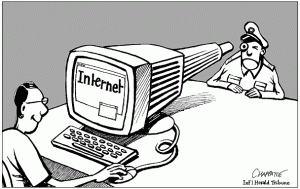
There already is a long history of surveillance, which was mainly used by a country to spy information from other countries or by a sovereign to monitor officials.
At present, surveillance coming into the public view probably is attributed to the NSA of the United States, which put its sights on the common people through monitoring the Internet and phone calls. The “scandal”, like a huge atomic bomb, swept over the world. Even people in other countries started to suspect if their governments were doing the similar things. The public were so astonished and indignant that we could see from the endless demonstrations at that time. I think the main reason that caused their intensive reactions is that the surveillance is a severe invasion of individual privacy. People felt offended since the personal privacy is one of the fundamental human rights, while the authority trod it by watching their communications for years without awareness of themselves.
Besides of the surveillance in the dark, there are more explicit monitoring cameras scattered around the city. You can see them everywhere, such as road crossings, bus stations, building entrances, supermarkets and almost all other the public facilities. They are connected to either government authorities or enterprises. Individuals may feel uncomfortable with these cameras (also heard from a classmate) as this kind of monitoring also gathers the faces and activities of them who pass through the cameras’ visible area. It sounds reasonable that we need the privacy even in public locations as well.
Both the situations above make individuals feel constrained because they know the surveillance is there, no matter what or who is behind. The people would never have unusual feelings if the NSA general surveillance was not exposed or the monitoring cameras were hidden deeply that they didn’t notice. Therefore, if or not it is more appropriate to cover the scandal, which may be released years later, and conceal the cameras from the perspective of comforting people’s states of mind regardless of current legal permissions and moral responsibilities is worth discussing. In comparison, why not strengthen the management and supervision to surveillants’ side for better use of privacy information?
A different manner of surveillance may be applied if unawareness is unacceptable. We will feel offended in the daily life when someone else is staring at you all the time without reasons. Similarly, we will also feel partially offended under the public cameras because we are watched by someone behind and there is indeed at least one security guard who is watching in front of monitors. So, what if the real person is replaced by computer algorithms, which are designed specifically for recognizing criminal behaviors rather than a guard monitoring and analyzing every movement of individuals.
If that makes you feel better, we also need to know that we are actually under kinds of surveillance in different modalities. For example, the shopping websites are gathering your every search, click and order trying to recommend suitable products. The search engine like Google collects searching history and clicks to provide better searching results. The email service providers scan every email to filter out spams to prevent you from junk information. They are all doing surveillance jobs by definition of the word. Nevertheless, we may instead feel well about these things, of course some don’t. I suppose the contrasting reactions between two types of surveillance derive from different direct benefited groups. The latter benefits individuals themselves whereas the former seems to benefit authorities or if in other words, the ruling groups. It would be formidable if the government is under the guise of preventing terrorism to sustain the domination like what in George Orwell’s novel. But for now, at least the public share common interests with their government. In this way, surveillance may be considered as a tool for the public safety.
Add yours Comments – 1
You pose many important questions–the benefits of surveillance are certainly visible in many parts of society (for example, in my apartment building, this is a widely accepted part of our security system; and yes, spam filters have become essential!). But I also wonder what happens when we think more about terms like ‘public’ — is there one ‘public’ or many? Does surveillance affect everyone equally?